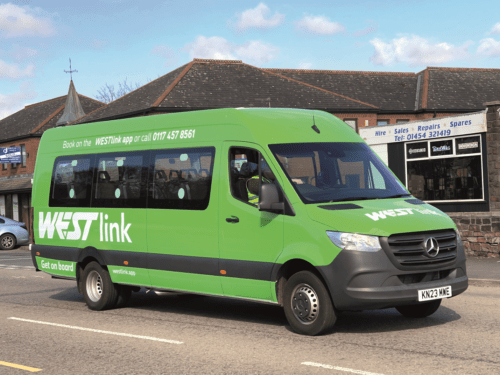
Demand responsive transport is always a contentious subject and is often met with mixed reactions from the travelling public. Richard Sharman takes a look at a new scheme in the West of England to see if it has the potential to attract car users and keep bus users connected to the wider network
Demand responsive transport (DRT) began in the West of England Combined Authority (WECA) area at the beginning of this month in the form of WESTlink. From 3 April residents were able to download a mobile app or call a phone number and book a minibus to pick them up anywhere in one of three operating areas and travel within them, but not travel between them, on the new minibus service.
WECA is headed by Metro Mayor Dan Norris, and covers the three geographical areas of Bath & North East Somerset, Bristol, and South Gloucestershire. The Combined Authority also supports the business-led Local Enterprise Partnership and covers the four West of England councils, including North Somerset Council.
Short lead time
The introduction of DRT to the WECA area is not something that has been in the planning for years, although it has been tried in various forms over the years in Bristol itself, but never with any longevity.
Whilst the marketing hype seemed to start around January this year, the actual tender notice to operate the DRT contract was put out in November 2022 and valued at £10 million. The description for this two year contract, based on a proposal in WECA’s Bus Service Improvement Plan (BSIP), was as follows: ‘The project is a key deliverable in the Government’s ambition to grow bus usage and to deliver better bus services. The project will also contribute towards National and Local Decarbonising Plans to achieve zero emissions fleet vehicles. The main aim of the DRT service is to support the local bus network by offering more service flexibility to parts of the region not directly served by the high frequency services available on the main corridors.’
It was also announced in January by WECA that 42 bus services would cease to be subsidised two days before WESTlink commenced, although WECA said that this move was unconnected with the introduction of WESTlink, and it is not designed as a replacement – something not allowed under the rules of the scheme’s funding. This move follows a raft of bus service changes in recent years throughout the region that has given rise to significant changes to the bus networks. The latest service withdrawals have not been received well by passengers and some operators, many of whom stepped at short notice to ensure bus services kept running after the collapse of HCT Group-owned Bristol Community Transport on 26 August.
[…]By subscribing you will benefit from:
- Operator & Supplier Profiles
- Face-to-Face Interviews
- Lastest News
- Test Drives and Reviews
- Legal Updates
- Route Focus
- Industry Insider Opinions
- Passenger Perspective
- Vehicle Launches
- and much more!


